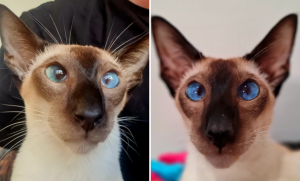What is 'Umbrella for Life'?
New Zealand is a nation of animal lovers, almost more so than anywhere else in the world.
Read more21 November 2022
Mishka is a young Siamese cat that has recently had his first birthday. Mishka’s favourite activity is spending time with his ‘skin’ brother, Micah, a Sphynx. Playfighting, zoomies, and fetch are just a few of the many things that keep them busy together all day long. At only a year old, Mishka has already been through a fair share of ups and downs in his short life, with ongoing visits to his veterinary due to being diagnosed with Ocular dry Feline Infectious Peritonitis (FIP). This is an infectious disease caused by a coronavirus mutating inside a cat – feline coronavirus (FCoV) is different from the coronavirus that causes COVID-19 in humans.
Up until the last couple of years, FIP was considered almost completely fatal, with no effective cure. However, the antiviral drug Remdesivir has been showing great success recently. Because the symptoms of FIP can be difficult to recognise, the condition is frequently diagnosed at a later stage, making recovery much more difficult to achieve. As further breakthroughs are discovered, the treatment protocols for FIP are being updated to improve the survival rate for cats globally.
After losing a kitten to FIP a year previously, Mishka’s owner, Selena, was already very knowledgeable about the disease. When her now-deceased kitten was first diagnosed with FIP, she joined a Facebook support group for New Zealanders and Australians with cats diagnosed with FIP (FIP Warriors Australia & New Zealand). Following the passing of Selena’s first kitten to FIP, she continued to stay up to date on treatment protocols in case she had to deal with the fatal disease again in the future.
Selena began to worry one weekend when Mishka’s coat seemed to be in a poor condition, he wasn’t very playful, had a lack of appetite, and his right pupil had changed shape (referred to as anisocoria). These were relatively broad symptoms and not overly specific to FIP, but eye changes can be a sign of something serious. Selena managed to get an appointment with her veterinary clinic, Sustainable Vets Dargaville, on the Monday after symptoms became apparent over the weekend. As soon as it was suspected that Mishka had FIP, Sustainable Vets Dargaville contacted Veterinary Specialists Aotearoa (VSA) in Auckland to book Mishka in for an urgent blood test and ultrasound. It was decided that Selena would drive Mishka directly to VSA, as time was of the essence and there was a risk of courier delays with sending blood tests down to Auckland. By that Thursday, Mishka had his first injection of Remdesivir, the lifesaving antiviral drug.

Mishka’s eye changes – prior to treatment and 2 days after treatment commenced.
Mishka’s treatment plan involved 14 days of subcutaneous (sub-q) injectable antiviral Remdesivir, followed by 70 days of Remdesivir anti-viral capsules. Once the 84 days of treatment are complete, he will be under 84 days of observation. The first 14 days of Mishka’s treatment were the most difficult for Selena, being the only human in the house made it hard to inject Mishka each day. The injectables took a huge toll on young Mishka, but Selena knew this was his best and only shot at survival. If Mishka ends up having a relapse, he will have to repeat the treatment plan from the beginning.
Having pet insurance with Petcover meant that Selena had no hesitation in doing everything she could to save Mishka’s life. “The ease in the claim process made a very stressful time much easier. I had peace of mind that I had enough cover to ensure I could save my boy.” She continues, “With the treatment diagnosis and protocols for FIP being quite costly, I never once thought ‘How much is this going to cost and where am I going to get the money from?’ I submitted the first claim on a Tuesday night after business hours and the money was in my bank account by Friday afternoon. That was impressive.” Having pet insurance with Petcover meant that Selena could immediately take action on getting Mishka the treatment he needed, this is especially vital with a disease like FIP, where it’s imperative to get treatment as soon as possible.
Mishka is now a participant in an Animal Referral Centre (ARC) case study on cats with Feline Infectious Peritonitis. ARC mentioned their excitement to finally be able to cure most cats of FIP and they are hoping this is the beginning of a new chapter of anti-viral treatments in veterinary medicine.
As of the time of publishing, Mishka has completed 26 treatments for FIP and is happy and healthy overall. He is lively, eating well, has a shiny coat and his eyes are back to normal. The Umbrella for Life benefit from Mishka’s Petcover pet insurance policy ensures he can get the treatment required to have the best chance of survival. The Petcover team wishes Selena and Mishka all the very best for their remaining treatments.
This case study is published with the prior consent of the owner. The content contained or made available through this case study is not intended to provide and does not constitute Medical advice nor it can be relied upon as care, cure or treatment for any medical condition. Always seek the advice of your qualified healthcare provider with any questions you may have regarding a medical condition or treatment.